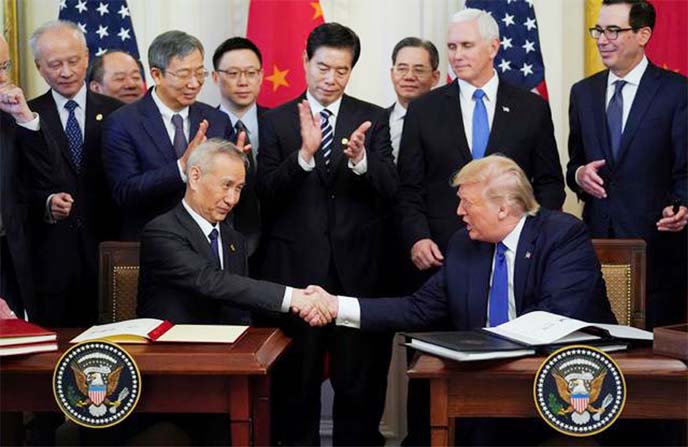
Reuters :
The Trump administration in its waning days took another swipe at China and its biggest firms on Thursday, imposing sanctions on officials and companies for alleged misdeeds in the South China Sea and imposing an investment ban on nine more firms.
The moves will further increase tensions with China, Washington’s strategic rival in Asia, days before President-elect Joe Biden takes office on Wednesday. The Biden transition team did not immediately respond to a request for comment.
Executives of state-owned enterprises, officials of the Chinese Communist Party and military, along with oil giant CNOOC will face new restrictions for allegedly using coercion against states with rival South China Sea claims.
Senior US officials told reporters on a call Thursday the new CNOOC restrictions will not apply to crude, refined fuels and liquid natural gas and do not apply to existing joint ventures with CNOOC that do not operate in the South China Sea.
Nine Chinese firms were added to the Pentagon’s list of companies with alleged ties to the Chinese military, including planemaker Comac and phone maker Xiaomi Corp.
Those companies will be subject to a new US investment ban which forces American investors to divest holdings of the blacklisted firms by November 11, 2021.
Shares in Xiaomi slumped over 8% in early Friday trading, against a 0.2% drop in the Hang Seng index, while CNOOC Ltd shares rose around 1%.
In its response, the Chinese embassy referred to January 7 Foreign Ministry comments accusing Washington of “pinning political and ideological labels on economic and trade issues and exploiting its state power to crack down on foreign companies, under the pretext of national security.”
The United States has long opposed China’s extensive territorial claims in the South China Sea, a potentially resource-rich area that is also a strategic trade route. Washington accuses Beijing of intimidating states such as Vietnam and the Philippines that have competing claims there.
China accuses Washington of trying to destabilize the region by sending warships and planes to the South China Sea.
“The United States stands with Southeast Asian claimant states seeking to defend their sovereign rights and interests, consistent with international law,” Secretary of State Mike Pompeo said in announcing the sanctions.
Pompeo said Washington was imposing visa restrictions on executives of Chinese state-owned enterprises and officials of the Chinese Communist Party and navy.
The Trump administration in its waning days took another swipe at China and its biggest firms on Thursday, imposing sanctions on officials and companies for alleged misdeeds in the South China Sea and imposing an investment ban on nine more firms.
The moves will further increase tensions with China, Washington’s strategic rival in Asia, days before President-elect Joe Biden takes office on Wednesday. The Biden transition team did not immediately respond to a request for comment.
Executives of state-owned enterprises, officials of the Chinese Communist Party and military, along with oil giant CNOOC will face new restrictions for allegedly using coercion against states with rival South China Sea claims.
Senior US officials told reporters on a call Thursday the new CNOOC restrictions will not apply to crude, refined fuels and liquid natural gas and do not apply to existing joint ventures with CNOOC that do not operate in the South China Sea.
Nine Chinese firms were added to the Pentagon’s list of companies with alleged ties to the Chinese military, including planemaker Comac and phone maker Xiaomi Corp.
Those companies will be subject to a new US investment ban which forces American investors to divest holdings of the blacklisted firms by November 11, 2021.
Shares in Xiaomi slumped over 8% in early Friday trading, against a 0.2% drop in the Hang Seng index, while CNOOC Ltd shares rose around 1%.
In its response, the Chinese embassy referred to January 7 Foreign Ministry comments accusing Washington of “pinning political and ideological labels on economic and trade issues and exploiting its state power to crack down on foreign companies, under the pretext of national security.”
The United States has long opposed China’s extensive territorial claims in the South China Sea, a potentially resource-rich area that is also a strategic trade route. Washington accuses Beijing of intimidating states such as Vietnam and the Philippines that have competing claims there.
China accuses Washington of trying to destabilize the region by sending warships and planes to the South China Sea.
“The United States stands with Southeast Asian claimant states seeking to defend their sovereign rights and interests, consistent with international law,” Secretary of State Mike Pompeo said in announcing the sanctions.
Pompeo said Washington was imposing visa restrictions on executives of Chinese state-owned enterprises and officials of the Chinese Communist Party and navy.

